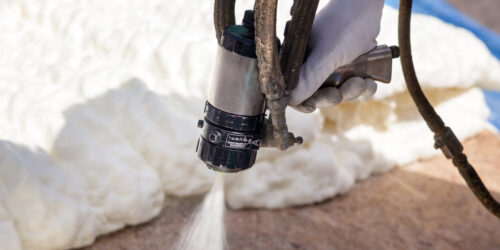Is My Property Suitable for Spray-On Insulation Foam?
- Best insulation for any home or business
- More than twice as efficient as traditional insulation
- Lowers energy bills, protects against environmental noise and cuts carbon emissions
Installed within the structure of your home, it’s no surprise choosing to install spray-on foam takes careful consideration. Providing reliable, unrivalled insulation, there are few specialist types of homes where spray-on foam cannot be installed.
From period properties to new builds, spray foam material is a contemporary product used widely throughout manufacturing. Present in lots of everyday products such as car seats, spray-on foam is generally suitable for any home.
Delivering cost-busting energy efficiency for your property, spray-on insulation foam is a decision you won’t regret. Lasting for over 30 years once in place, spray foam is environmentally-friendly, maintenance free and able to help lower carbon emissions.
Let’s take a look at the property types and situations spray foam is and isn’t suitable for. We’ll explore the following questions for full coverage of the topic.
Ready for spray foam? Use our quote comparison tool to find out how much you'd pay. It only takes a minute.
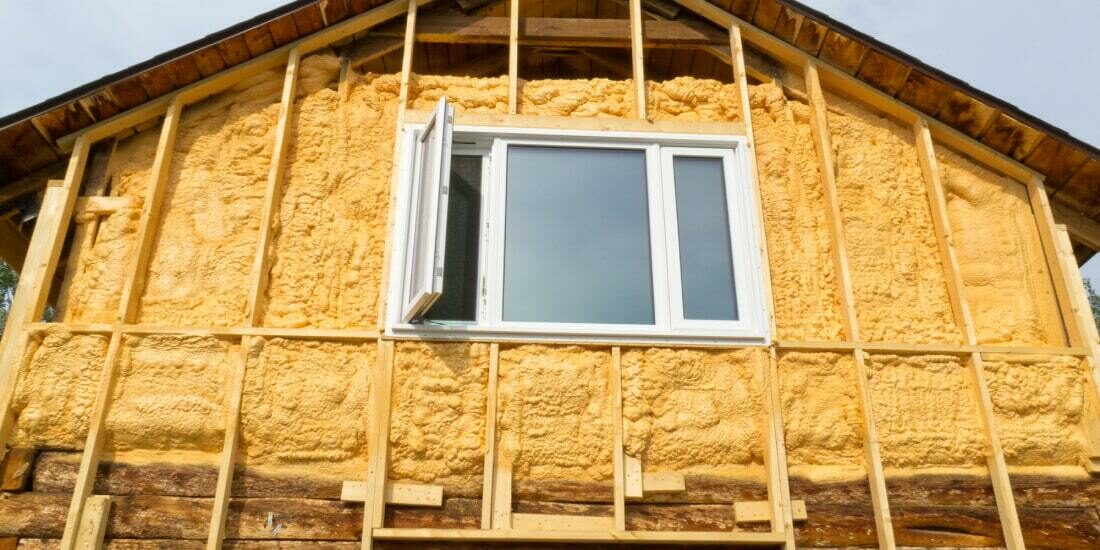
What's On This Page?
Click the links below and head straight to a specific section of the article.
What Is Spray-On Insulation Foam?
In use since 1937, spray-on insulation foam is the best type of insulation we have for domestic, commercial and industrial use. Made from polyurethane, a versatile liquid plastic, when mixed together in the nozzle of the spray gun as it is applied, the chemical reaction between polymers and urethane bonds causes it to expand .
Looking like a cloud, the bubbly mixture takes up the entire vacant cavity to which it is applied, creating an airtight seal.
Drying quickly into a hard mass, spray-on insulation is a permanent treatment which leaves heat unable to pass through. Suitable for walls, roofs, floors, lofts and attics, depending on the type you choose, your insulation may also effectively prevent noise or water vapour travelling through.
The two types of spray foam insulation available are open cell spray-on foam and closed cell spray-on foam. Of the two, closed cell foam spray insulation delivers the greatest insulation but also prevents water vapour escaping which can cause condensation.
On the other hand, open cell spray foams larger bubbles trap sound waves whilst letting water travel through, providing a sound barrier which holds appeal for many.
Ultimately, the decision about which type of spray-on foam insulation to install rests with your installer which is why you should never attempt to carry out the work yourself. Your experienced, professional spray-on insulation foam installer will carry out a compete assessment of your property before beginning the work.
The assessment, known as a survey will evaluate the condition and suitability of the area identified for insulation, condensation levels, the type of spray foam which would be best, costs and more.
It is only once you have approved the results of the survey that work can commence.
Where Should You Not Use Spray-On Insulation Foam?
Spray-on insulation foam is a tried and tested product, widely used around the world since the 1930s. Popular for use in roofs where heat loss can be up to 25%, according to Energy Saving Trust, and waste through walls can be as much as 33%, spray-on insulation foam offers plenty of benefits.
However, there are a tiny number of specialist properties where spray foam can’t be used for various reasons.
Listed buildings: If you have a listed building you will need to seek Listed Building Consent to install spray-on insulation foam and it is not usually given. The reason for this is spray-on foam is seen as a condensation risk.
It is also viewed as having the potential to damage the historic structures of your home because it is a permanent application applied directly onto your preserved structures.
Properties with thatched roofs: It is the same situation for thatched roofs. Attempting to apply spray-on insulation foam to your heritage roof will, in most cases, not be viewed well. Generally spray foam doesn’t require planning permission but it’s not usually viewed well by planning offices so it’s always best to check with them first.
Properties in conservation areas: For the same reasons it’s best to seek advice from your local planning office if you live in a conservation area. Remember spray-on insulation foam is permanent so check it is ok before commencing work.
Learn more about insulating historic buildings at Historic England.
Closed cavity walls: Spray-on foam expands rapidly to fill an empty space so it must not be used in closed cavity walls, brick exteriors or other closed areas.
On flammable mechanics: If insulating your loft or roof, due to its expanding properties, your installer should avoid any electrical boxes, including ceiling light boxes. Incorrect application in these area would be a serious fire risk as blocking ventilation could cause overheating and other problems.
Breathing or skin problems: Chemicals emitted during application put those with breathing or skin problems at risk. This is another reason why installation is only for experts who wear PPE and are trained to apply spray-on insulation foam safely.
You will need to keep out of the area during installation and for a few hours once installation is complete. If you have breathing or skin problems, airborne particles could cause issues so seek professional advice before commissioning the work.
FAQs
Can Mice Chew Through Spray-On Insulation Foam?
Unlike traditional insulation materials which held appeal for mice and other rodents, spray-on insulation foam is a thick, robust material which they can’t chew through. Best of all, because spray foam expands to fill every nook and cranny, there’s no gaps for pesky rodents to gain entry to your property via those areas.
Obviously, it can’t account for every part of your home but it’s certainly the case that spray-on insulation foam is a good guard against rodents where it has been installed.
Does Spray-On Insulation Foam Meet UK Building Regulations?
Yes, the British Board of Agrément provide certification for the foam spray insulation industry in The UK. The BBA have a remit to provide accountability, certification and mitigate risk across the construction industry.
Responsible for everything from auditing to inspection and research, the spray-on insulation foam company you choose should be approved by the BBA and have installers who are certified by the British Board of Agrément.
BBA-approved installers will have completed BBA training and have the certificate to prove they are competent to survey your home for: suitability of spray-on foam installation, suggest the best spray-on insulation foam to use in your home and advise you about any additional work required.
Your professional installer should only use BBA-approved products during the work which should come with certificates to evidence approval.
Operating in line with UK building regulations and health and safety laws, you can be sure your installation will go to plan. Your chosen company should also be insured and your work come with a full warranty.
Is Spray-On Insulation Foam Suitable for Period Properties?
Yes, unless your period property fits any of the conditions already discussed, spray-on foam should be suitable for your home. However, as with an any installation of spray foam insulation, you should hire a professional spray-on insulation foam installer to carry out the work.
Your trained installer will conduct a thorough survey of your home first.
If your home is approved under the survey, all should be well. Always ensure the spray foam installation company you choose is insured and your insulation comes with a full warranty. For more about how to hire a good spray foam installer, head to our guide.
Alternatively, find the best spray-on insulation foam installers near you by filling in your details in our short form.
Summary
Hopefully this should now give you a better insight as to whether spray-on insulation foam is suitable for for your property. If it is and you'd like to know more information, you can enter a few details and one of our professionals will be in touch shortly. How much does loft insulation cost in 2024?
Related articles
View all Insulation articles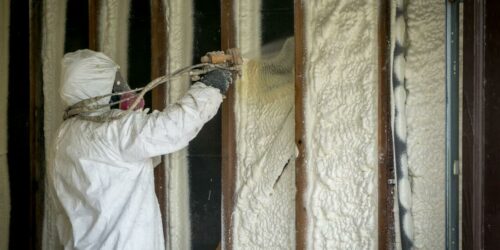
How Long Does Spray Foam Insulation Last?
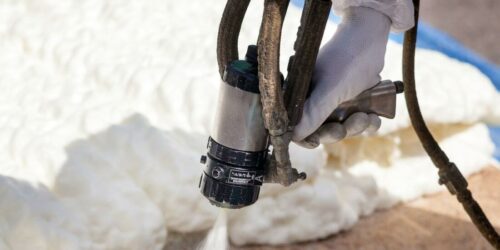
Can I Install DIY Spray Foam Insulation Myself?
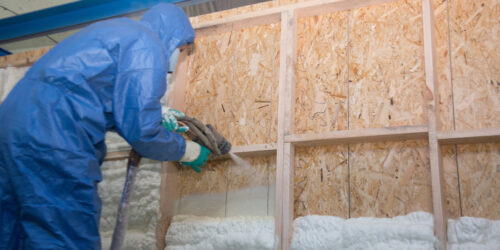
Six Benefits of Spray Foam Insulation
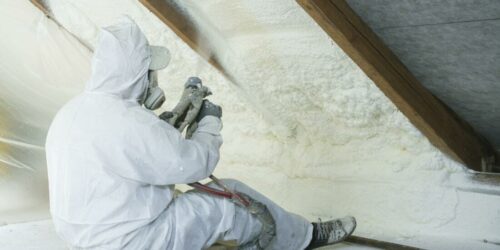
Why Consider Spray Foam Insulation in Roofs?
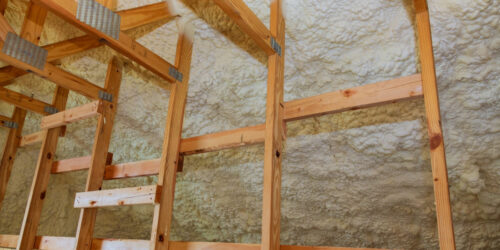
Icynene Spray Foam Insulation: A Complete Guide
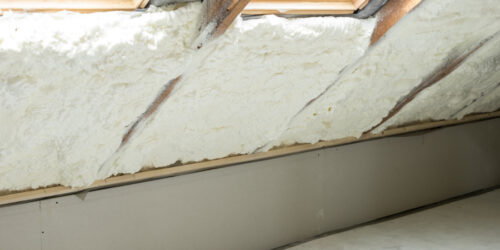
Spray Foam Insulation Installers: What to Expect
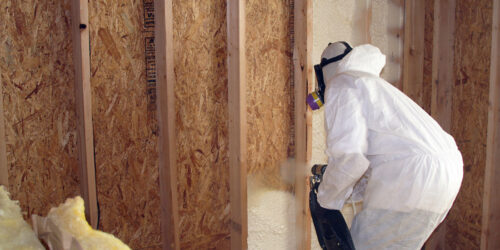
Open Cell vs Closed Cell Spray Foam Insulation: What’s The Difference?
